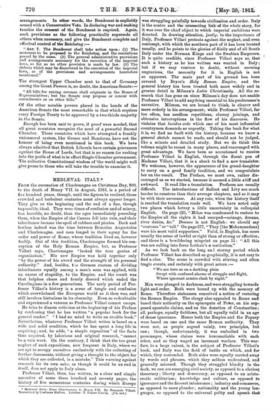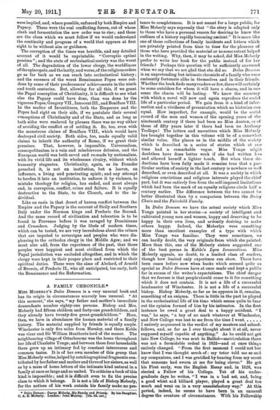MEDIEVAL ITALY.*
FROM the coronation of Charlemagne on Christmas Day, 800, to the death of Hemy VII. in August, 1313, is a period of five hundred years, though, until the figures be realized, those crowded and turbulent centuries must always appear longer. They give us the beginning and the end of a fine, though impossible, ideal. They were times of confusion and of misery, less horrible, no doubt, than the ages immediately preceding them, when the Empire of the Caesars fell into ruin, and their inheritance became the spoil of robbers and pirates. Dark and lawless indeed was the time between Romulus Augustulus and Charlemagne, and men longed in their agony for the order and power of Rome, whose tradition lived on, however feebly. Out of this tradition, Charlemagne formed his con- ception of the Holy Roman Empire, but, as Professor Villari says, Charlemagne "lacked' the true genius of organization." His new Empire was held together only "by the power of his sword and the strength of his personal authority." And, besides, Vie German custom of dividing inheritances equally among a man's sons was applied, with an excess of stupidity, to the Empire, and the result was that helpless chaos and family discord which ended the Carolingians in a few generations. The early period of Pro- fessor Villari's history is a scene of tangle and confusion which overwhelmed the European world as it then was, and still involves historians in its obscurity. Even so redoubtable and experienced a veteran as Professor Villari cannot escape.
He tries to disarm criticism at the beginning of his Preface by confessing that he has written "a popular book for the general reader." "I bad no mind to write an erudite book." Nevertheless, whatever Professor Villari writes is based on a wide and solid erudition, which he has spent a long life in acquiring ; and, he adds, " a simple exposition " of the facts thus acquired, by laborious and original research, "cannot be a vain work. On the contrary, I think that the too great neglect of such expositions, now frequent in Italy, where we are apt to occupy ourselves exclusively with the collecting of further documents, without giving a thought to the object for which they are collected, is a mistake." This warning against research for its own sake, as though it could be an end in itself, does not apply to Italy alone.
Professor Villari, then, has written, in a clear and simple narrative of some three hundred and seventy pages, the history of five momentous centuries during which Europe
• Maimral Italy: Prom Charlemagne to Henry VII. By Pasquale Villari. Trunalatcd by Costanza Huston. London: T. Fisher Urmin, net.] was struggling painfully towards civilization and order. Italy is the centre and the ',connecting link of the whole story, for it was ever the chief object to which imperial ambitions were directed. In drawing attention, justly, to the importance of Italy, Professor Villari protests against the neglect, and even contempt, with which the southern part of it has been treated usually, and he points to the glories of Sicily and of all South Italy under the Norman Kings and the Swabian Emperors. It is quite credible, since Professor Villari says so, that such a history as he has written was wanted in Italy ; but if we may venture to doubt, without seeming ungracious, the necessity for it in English is not so apparent. The main part of his ground has. been covered by Bryce's Holy Roman Empire, and the general history has been treated both more widely and in greater detail in Milman's Latin Christianity. All the re- search that has gone on since Milman's day does not enable Professor Villari to add anything essential.to his predecessor's narrative. Milman, we are bound to think, is- clearer and more orderly in his arrangement; while Professor. Villari, far too often, has needless repetitions, clumsy joinings, and obtrusive interruptions in the flow of his discourse. He violates that lucidus ordo which one of his most influential countrymen demands so urgently. Taking the book for what it is, we find no fault with the history, because we know a general sketch cannot be made, and should not be judged, like a minute and detailed study. But we do think this volume might be recast in many places, and rearranged with great advantage. We have been so accustomed to receive Professor Villari in English, through the fluent pen of Madame Villari, that it is a shock to find a new translator. We welcome, however, the appearance of his grand-daughter to carry on a good family tradition, and we congratulate her on the-result. The Preface, we must own, rather dis- couraged us as we started, because it seemed a little s tiff and awkward. It read like a translation. Prefaces are usually difficult. The introductions of Sallust and Livy are much harder to construe than their average chapters, and so it may be with their successor. At any rate, when the history itself is reached the translation reads well. We have noted only two places which betray a little uncertainty in colloquial English. On page 225, " Milan was condemned to restore to the Empire all the rights it had usurped—coinage, douane, river duties, Ste." Douane is not English : we should say "customs " or " toll." On page 277, " They [the Mohammedans] were his most valid supporters." Valid, in English, has more usually the sense of lawful or right than of strong or effective; and there is a bewildering misprint on page 51: "All this, was are calling into force Lothair's o institution."
As we look back on the long an 1 stormy period which Professor Villari has described so graphically, it is not easy to find a clue. The scene is crowded with stirring and often tragic events, and certainly with great actors :—
" We are here as on a darkli g plain
Swept with confused alarms of struggle and flight, Where ignorant armies clash by night."
Men were plunged in darkness, and were struggling towards light and order. Both were bound up with the memory of Rome. Therefore statesmen conceived a notion of restoring the Roman Empire. The clergy also appealed to Rome and- based their authority on the episcopate of Peter, on his sup- posed apostolic claims, and on the donation of Constantine ; all, perhaps, equally fictitious, but all equally valid in an age of dense ignorance. Hence both the Empire and the Papacy were based on one and the same Roman authority. They were not, as people argued vainly, two principles, but one ; though, unfortunately, it was embodied in two personages, whose claims were irreconcilable with each other, and so they waged an incessant warfare. This war- fare, to a large extent, is the subject of Professor Villari's book, and Italy was the field of battle on which, and for which, they contended. Both sides were equally carried away by words and phrases, which they seldom understood, and generally misused. Though they struggled blindly in the dark, we can see emerging civil society, as opposed to a clerical theocracy ; liberty and democracy, as opposed to an aristo- cratic militarism; knowledge and culture, as opposed to ignorance and the fiercest intolerance ; industry and commerce, as opposed to mere plunder ; nationality and the young lan- guages, as opposed to the universal polity and speech that
were implied, and, where possible, enforced by both Empire and Papacy. These were the real conflicting forces, out of whose clash and fermentation the new order was to rise; and these are the clues which we must follow if we would understand the continuity and progress of a world that appears at first sight to be without aim or guidance.
The corruption of the times was horrible, and any detailed account of it would be unprintable. " Corruptio optimi pessima"; and the state of ecclesiastical society was the worst of all. The degradation of the lower clergy, the worldliness of the episcopate, and thelaxity, and worse, of the religious orders go as far back as we can reach into ecclesiastical history; and the excesses of the worst Renaissance Popes were out- done by some of their predecessors' achievements in the ninth and tenth centuries. But, allowing for all this, if we grant the Papal conception of Christianity, it is difficult to see what else the Papacy could have done, than was done by the vigorous Popes, Gregory VII., InnocentIU., and Boniface VIII. In the matter of Investitures, both the Emperors and the Popes had right on their side, if we postulate their several conceptions of Christianity and of the State, and as long as both sides were enslaved by phrases there was no way either of avoiding the conflict or of settling it. So, too, even with the monstrous claims of Boniface VIII., which would have destroyed civil society. Both sides, too, made equally valid claims to inherit the authority of Rome, if we grant their
premises. That, however, is impossible. Universalism, cosmopolitanism is a vain and mischievous delusion, and the European world was both saved and re-made by nationalism, with its vivid life and its wholesome rivalry, without which humanity stagnates. Christianity, again, as its Founder preached it, is not an institution, but a leaven, an influence, a living and penetrating spirit ; and any attempt to harden it into an institution, to enforce it by violence, to mistake theology for religion, has ended, and must always end, in corruption, conflict, crime and failure. It is equally destructive to the State, to the Church, and to the in- dividual.
Like an oasis in that desert of barren conflict between the Empire and the Papacy is the account of Sicily and Southern Italy under the Norman kings and Frederic the Second. And the same record of civilization and toleration is to be found in Provence before it was ravaged by Dominicans and Crusaders. Judging by the libels of modern times, which can be tested, we are very incredulous about.the crimes that are imputed to sovereigns and peoples who were dis- pleasing to the orthodox clergy in the Middle Ages; and we must also add, from the experience of the past, that those peoples were happiest and most civilized from which the Papal jurisdiction was excluded altogether, and in which the clergy were kept in their proper place and restricted to their spiritual duties. These were the aims of Abelard, of Arnold of Brescia, of Frederic II., who all anticipated, too early, both the Renaissance and the Reformation.









































 Previous page
Previous page